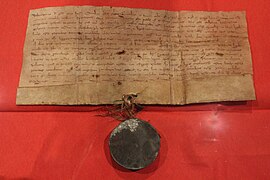| This article needs additional citations for verification. Please help improve this article by adding citations to reliable sources. Unsourced material may be challenged and removed. Find sources: "Town privileges" – news · newspapers · books · scholar · JSTOR (September 2024) (Learn how and when to remove this message) |


Town privileges or borough rights were important features of European towns during most of the second millennium. The city law customary in Central Europe probably dates back to Italian models, which in turn were oriented towards the traditions of the self-administration of Roman cities.
Judicially, a borough (or burgh) was distinguished from the countryside by means of a charter from the ruling monarch that defined its privileges and laws. Common privileges involved trade (marketplace, the storing of goods, etc.) and the establishment of guilds. Some of these privileges were permanent and could imply that the town obtained the right to be called a borough, hence the term "borough rights" (German: Stadtrecht; Dutch: stadsrechten). Some degree of self-government, representation by diet, and tax-relief could also be granted. Multiple tiers existed; for example, in Sweden, the basic royal charter establishing a borough enabled trade, but not foreign trade, which required a higher-tier charter granting staple right.
See also
- City rights in the Low Countries
- City status in the United Kingdom
- Confoederatio cum principibus ecclesiasticis
- German town law
- Zipser Willkür
- Imperial free city
- Kulm law
- Lübeck law
- Magdeburg rights
- Market town
- Royal free cities in the Kingdom of Hungary
- Scottish Burgh
- Town privileges in Norway
- Town privileges in Sweden
References
- ^ Blockmans, Wim; Hoppenbrouwers, Peter (3 February 2014). "Towns and the Urbanisation of Medieval Society". Introduction to Medieval Europe 300–1500. Routledge. pp. 305–312. ISBN 978-1-317-93425-7.
- ^ Whittock, Martyn (7 February 2013). A Brief History of Life in the Middle Ages. Little, Brown Book Group. ISBN 978-1-4721-0766-4.
- Dymond, Dorothy (6 November 2023) . An Introduction to Medieval History. Taylor & Francis. ISBN 978-1-003-82466-4.
- Heibaut, Dirk; Heikki, Pihlajamäki (28 December 2023). "High and Late Middle Ages (1100-1500)". A Companion to Western Legal Traditions: From Antiquity to the Twentieth Century. Brill. pp. 205–206. ISBN 978-90-04-68725-7.
This European history–related article is a stub. You can help Misplaced Pages by expanding it. |
This article relating to the law of Europe or of a European country is a stub. You can help Misplaced Pages by expanding it. |